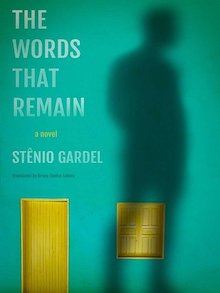
translated by Bruna Dantas Lobato
New Vessel Press, 2023
Turmoil burrowing deep in the body can produce an outward calm: measured speech, deliberate action, quashed lust. Literature has often matched repression’s timbre, especially when it involves queerness. The serene mountain landscapes of Brokeback Mountain as backdrop to Jack and Ennis’s forbidden and doomed love come to mind.
The Words that Remain by Stênio Gardel, translated from the Portuguese by Bruna Dantas Lobato, takes a different approach. Gardel’s ferocious debut novel roars from a deep pit of longing and puts repressed desire in a chokehold, mining it for any and all of its redemptive qualities. Despite its brevity, the novel feels like an epic.
At its center is Raimundo, an elderly and illiterate tailor living in an unnamed Brazilian city who is haunted by a letter given to him years before by his first love, Cícero. When we meet Raimundo, he’s signed up for literacy classes with the sole purpose of finally reading Cícero’s letter, which has been both a treasure and an albatross.
While learning to read is Raimundo’s ultimate goal, it’s the powerful effects of writing that he’s unprepared for. Language traps Raimundo in the past, but the possibility of expressing himself also promises freedom and release: “It was a nice feeling, that he had it in him to get the words out, though they still got scrambled inside his brain, got caught in his throat. He couldn’t go on like that anymore. He had to give them a body of their own, that was theirs alone.”
The writing classes also provoke a torrent of memories and feelings of guilt. Raimundo’s memories are rose-tinted even when they’re painful. Crosses, rivers, and other symbols abound. His romance with Cícero, the moment his parents find out, the abuse he suffers at the hand of his father—all take on a mythic grandeur. But as Raimundo continues to read and write, his writing becomes more grounded and useful as a tool for coming to terms with his past.
Raimundo runs away from home—after suffering abuse from his father and being practically forced out by his mother—he takes a job unloading trucks and spends his time meeting men at porn theaters. Raimundo meets Suzanny, a strong-willed trans woman with whom Raimundo develops an important relationship.
A lesser writer than Gardel might have painted Raimundo as a victim of his circumstances, but Gardel does more than that by showing how even those marginalized like Raimundo can fall prey to intolerance. For instance, when Raimundo first encounters Suzanny, he and a group of men make fun of her when she walks by. In return, Suzanny calls him out for being gay. Raimundo’s own shame leaves him feeling threatened, and when they see each other again, Raimundo beats up Suzanny so badly that she has to go to the hospital. Feeling guilty, Raimundo ends up becoming Suzanny’s primary caregiver, and their friendship blossoms. When Raimundo eventually tells Suzanny about Cícero’s letter, she’s the one who encourages him to learn to take classes so he can finally read it: “closure is what’s good for you, the right ending that pushes us in the right direction, if it weren’t for the finality of the end, would we just live the same day every single day?”
Any novel this ambitious and compressed is almost sure to be frenetic and exhausting, and Gardel’s is no exception. But there’s a genuineness to the prose even when it feels like it’s trying too hard or is overly artificial in its construction. When the novel breaks from Raimundo’s point of view, the ruptures are, at first, off-putting. On a second read, however, these moments feel essential to understanding Raimundo’s inner world.
In one of Raimundo’s writing classes, his professor lectures about how poetry can elevate words beyond their ordinary meanings: “Words are stretched, so where words alone can’t go, with poetry they can, they fly, like the bird, the bird that can hear loud silence, the loud silences…” As Raimundo is able to get words out onto the page, they seem to have this doubling effect of describing pain but also alleviating it so he can move on and seek closure. The title then becomes more of a question: What are the words that remain? Gardel suggests that they are only ones worth saving, the only ones that will save us.
+++
Stênio Gardel was born in 1980 in the rural northeast of Brazil. The Words That Remain is his first novel.
+
Bruna Dantas Lobato is a Brazilian writer and literary translator who lives in New York and St. Louis.
+
Patrick Boyd is a writer, director, and actor who currently resides in Los Angeles with his partner, Sining, and their two cats, Raymond and Bridget Jones.